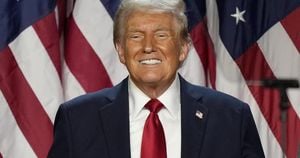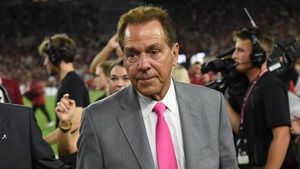With the stage set for another thrilling chapter in American governance, former President Donald Trump is making headlines once again. This time, it’s not just about campaign promises or rallies; it’s who he’s appointing to lead the nation's health agencies and their unsettling credentials. Trump has chosen Dr. Jay Bhattacharya, known for his controversial stance on the COVID-19 pandemic and lockdown measures, to head the National Institutes of Health (NIH). His decision has sparked heated debates among health experts and political analysts alike.
Dr. Bhattacharya, who serves as both an economist and physician at Stanford University, is widely perceived as a contrarian figure in the health community. His views sharply contradict established public health recommendations, rendering his appointment alarming to many within the infectious disease field. Bhattacharya is perhaps best known for co-authoring the Great Barrington Declaration, which argued for minimal restrictions on healthy individuals during the pandemic, sidelining protective measures targeted at vulnerable populations.
This appointment, following Trump’s other selections of similarly controversial figures, marks a significant shift. Robert F. Kennedy Jr., another vocal critic of prevailing health protocols, is poised to take the reins of the Health and Human Services Department. Kennedy has expressed his intent to redirect the NIH's focus from infectious diseases to chronic conditions, effectively sidelining infectious disease control measures.
Meanwhile, Dr. Martin Makary, slated to lead the Food and Drug Administration (FDA), has previously made incorrect predictions about the pandemic’s progression, claiming we were heading toward control of infections by mid-2021. His optimistic forecasts stand at odds with recent realities, as the number of COVID-19 cases surged again, particularly over the winter and with the arrival of variants.
Perhaps even more troubling is the nomination of Dr. David Weldon for the Centers for Disease Control and Prevention (CDC). A former congressman, Weldon has propagated the long-debunked notion linking thimerosal, used as a preservative in some vaccines, to autism. He has even pushed for legislation intending to strip the CDC of vaccine safety responsibilities, citing alleged conflicts of interest.
Dr. Mehmet Oz, known more for his television persona than for public health credentials, has also been brought on board, tasked with overseeing Medicare and Medicaid. His advocacy for hydroxychloroquine to treat COVID-19, which was later found to be ineffective and dangerous, reflects the precarious grounds on which these new appointments stand.
Experts warn the consequences of these appointments could be dire. John P. Moore, a virologist at Weill Cornell Medical College, emphasizes the potential human toll as this new leadership might lack the necessary expertise and commitment to manage future health crises effectively. Moore posits, “If the worst-case scenario happens and we have a serious public health crisis, the body count is going to be enormous because these guys don’t have the skills or the will to do anything about it.”
What contributes to the unease around these selections is Trump’s previous actions during the onset of the pandemic, such as dismantling the White House’s pandemic response office set up by President Obama. Experts like Dr. David Kessler are particularly wary of the fallout, worrying the integrity and expertise of longstanding officials may be compromised.
Looking to the future, there's sensibility behind preparing for inevitable health crises—this anticipation looms large as the H5N1 bird flu virus presents risks of mutation, potentially enhancing transmissibility among humans. Experts uniformly agree: minimizing expertise at the helm of health agencies strikes at the heart of public health readiness.
Dr. Paul Offit, another infectious disease expert, accentuates the urgency of maintaining funding and research for infectious diseases, countering suggestions to cut NIH funding for chronic disease exploration. Offit recalls how the rapid vaccine development during COVID-19 relied heavily on years of prior research supported by NIH funding.
The rising tension centers around the firm belief there is no advantage to maltreating public health infrastructure. Acknowledging both infectious and chronic conditions are facets of the same health equation is imperative, as experts like Dr. Carlos del Rio argue against the stark divide proposed by Kennedy. Del Rio insists, “This dichotomy between infectious disease and chronic disease is a false dichotomy.”
Despite the contentious climate surrounding Trump’s health appointees, not all was lost during the pandemic. Many experts reminisced about the lessons learned. For example, the acknowledgment from health officials admitting previous measures might’ve been excessive reflects growing humility and adaptability. Yet, the question remains: will future bureaucrats embrace those lessons, or will past mistakes echo again?
Now, as Trump gears up to reclaim office with plans to appoint his health leadership within the coming months, what happens next? Health experts call for vigilance. With containment and health strategies developing every day, preparing for crises informed by expertise will be the new litmus test for public health effectiveness. What’s alarming is the potential for continued dismissal of expert advice amid the struggle to control the next infectious wave. Urgency echoes through the halls of public health: will the right choices be made?
America finds itself at another crossroads, this time involving not only the leadership but the path forward for public health policy. The repercussions of these appointments will not just reflect on Trump's administration but will reverberate through society, potentially influencing lives and livelihoods for years to come. How Trump’s appointees maneuver these formidable challenges will shape the nation’s health policy during turbulent times. Only time will tell how this all plays out, as concerns loom about the possible reemergence of another pandemic—and we must collectively hope for the best but prepare for the unpredictable.



